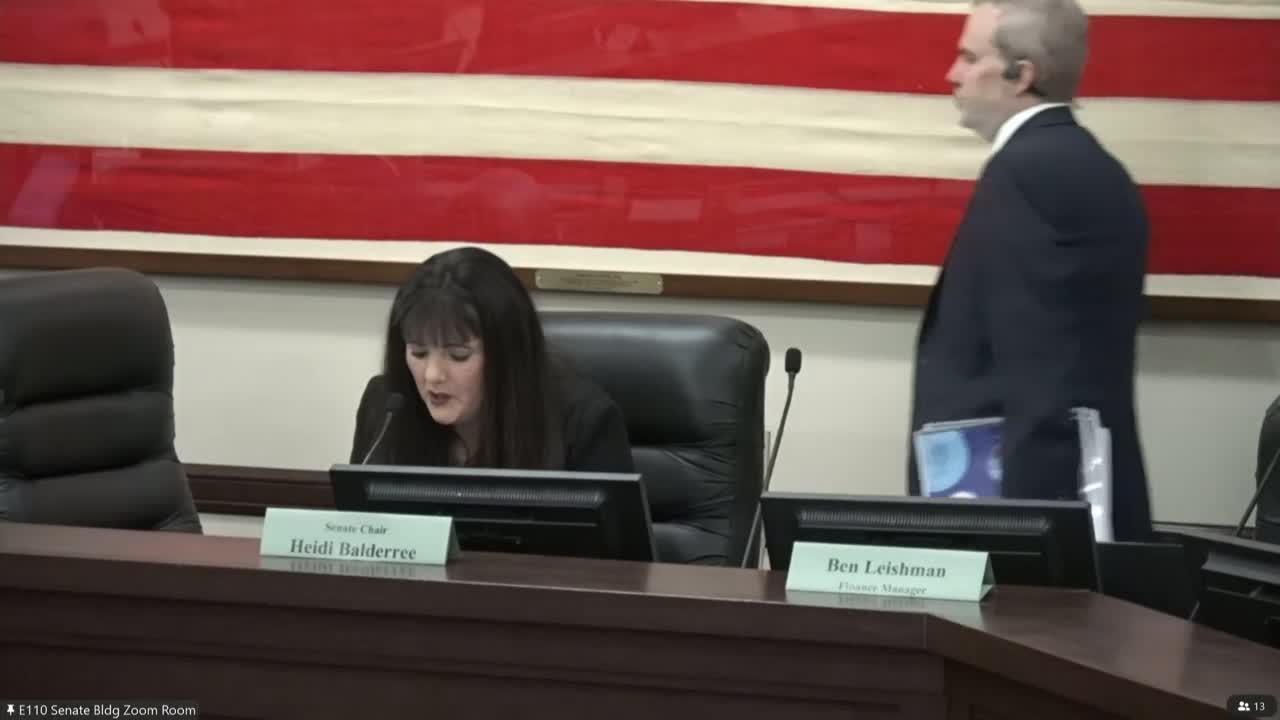Appropriations subcommittee hears a string of education funding pitches: emergency ELL aid, school meals, telehealth and youth programs
Get AI-powered insights, summaries, and transcripts
Subscribe
Summary
The Legislature’s public education appropriations subcommittee heard a wide array of smaller funding requests Tuesday, from emergency aid for English‑learner surges to a $160 million proposal to cover school meals statewide.
The Legislature’s public education appropriations subcommittee heard a wide array of smaller funding requests Tuesday, from emergency aid for English‑learner surges to a $160 million proposal to cover school meals statewide.
Many sponsors framed the requests as targeted, preventive investments intended to keep students in class, support teachers and build long‑term pathways to careers.
Representative Candace Perucci asked the committee to fund HB42, a $5 million one‑time emergency grant program for schools that experience sudden increases in English‑learner enrollment. The grants would be distributed through the State Board of Education for schools that demonstrate a significant enrollment spike (the bill sets a threshold and floor to avoid small‑district percentage distortions). Perucci said the funds would pay for supports such as English‑language certification for teachers and short‑term wraparound help while longer‑term funding (the WPU add‑on) catches up.
Food security was the subject of two separate proposals. Representative Erik Clancy presented HB100, a targeted $2.8 million request to eliminate the reduced‑price student co‑pay (currently 40¢ per meal on average) and expand summer EBT in partnership with private philanthropy; sponsors said philanthropic partners have committed about $618,000 toward a summer EBT match. Senator Luz Escamilla urged broader action in SB173, a much larger plan that would provide universal school breakfast and lunch with an estimated state ask of roughly $160 million; she said studies show an estimated $9 return for every $1 invested in school feeding programs and argued state support is a long‑term investment in the workforce.
Other program requests and pilot proposals heard included:
- K–12 computer science: Stan Lockhart summarized a multi‑year, multi‑dollar program that has expanded via prior appropriations ($5M, then $8M, $8M, $10M). He warned that without continued funding the initiative could face a 60% cut and urged at least a small 1‑time allocation to sustain district momentum.
- Project 29 (2034 Olympics outreach): Lawmakers heard a $1‑time pilot proposal to place athletes and Paralympians in schools in a 10‑school pilot designed to connect youth and communities statewide ahead of the 2034 Winter Olympics.
- Rural school athletic facilities grants: Representative Tiara Occere and constituent Nicole Brown asked for a $5 million one‑time fund capped at $500,000 per project to repair or replace unsafe athletic facilities in rural districts (sponsor noted bill text references districts under either 1,000 or 3,000 students; sponsor asked committee to follow the bill language in the final draft).
- Student Credential Account / YouScience: Senator Luz Owens and Utah YouScience director Kelly Openshaw highlighted rapid growth in the program’s aptitude assessments. Openshaw said more than 175,000 students have completed the assessment statewide and that districts use the results to guide CTE, internships and early career exposure.
- Weighted vests / sensory‑input pilot: Representative Walt Shelly and Aaron Peterson (special education director) described a $12,000 pilot to provide weighted vests and other proprioceptive tools to wellness rooms as voluntary, non‑coercive supports intended to reduce escalations and avoid seclusion rooms; Peterson said the protocol would align with Utah code (277609) and the State Board’s Least Restrictive Behavior Interventions guidance.
- Cell‑phone storage assistance: Senator Fillmore presented a $1.9 million one‑time request to help local districts buy storage/locker solutions if districts choose to restrict phones during the school day; he said the amount equates to roughly $5–$6 per secondary student.
- Stand for Kind (anti‑bullying): The long‑running nonprofit said reimbursement funding has allowed it to scale; chairman Jay Francis said the organization served more than 300 schools and roughly 300,000 students last year and that state seed funding has helped leverage private donations.
- Trust‑based Relational Intervention (TBRI) pilot: Amy Huggins, a classroom teacher and TBRI coach, urged funding for a pilot coaching program that trains teachers on relationship‑based interventions to reduce behavioral incidents and improve retention; Huggins offered classroom anecdotes of success and urged a pilot to collect data and scale the model.
- School‑based telehealth: Representative Doug Welton and Shelley Cooper of Intermountain Health described a telehealth pilot that provided equipment (otoscope, exam cam, digital stethoscope) to several districts; Cooper said a Wasatch County 2022 pilot saved about 5,500 days of missed school and that 96% of telehealth visits keep students at school. Sponsors asked for funding to expand equipment to additional districts and noted Intermountain and providers are partners in the model.
Several sponsors and LFA staff noted the tight revenue situation and that not every request will be funded. Committee members and staff encouraged presenters to provide detailed fiscal notes and implementation plans; the committee did not take final votes on any of the requests during the hearing.
Committee schedule note: Because the subcommittee had to adjourn for floor time, some Q&A was deferred to follow‑up discussions outside the hearing.
